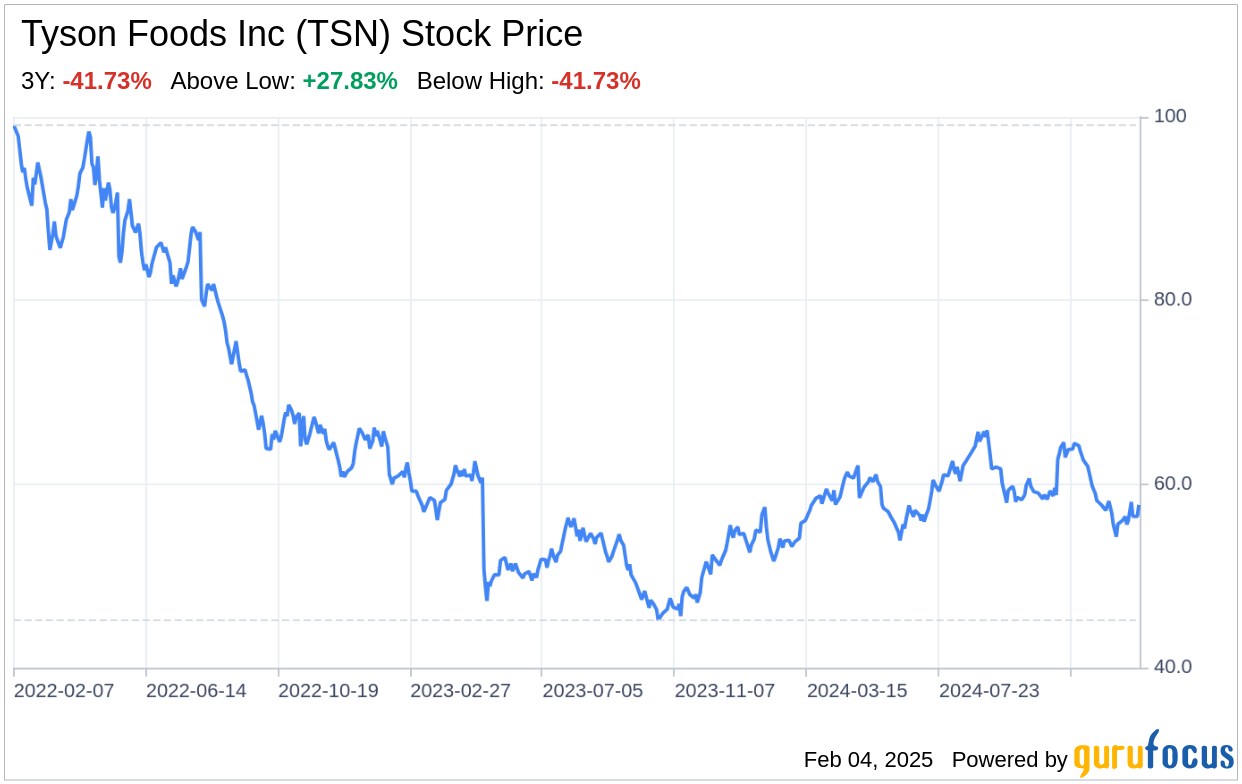On February 3, 2025, Tyson Foods Inc (TSN, Financial), a leading protein-focused food producer, released its 10-Q filing, revealing a financial snapshot of the company's performance. The filing indicates a year-over-year increase in sales from $13,319 million to $13,623 million, with a substantial rise in net income from $107 million to $359 million. This financial overview sets the stage for a comprehensive SWOT analysis of Tyson Foods Inc, providing investors with insights into the company's strategic positioning and future prospects.

Strengths
Brand Power and Market Presence: Tyson Foods Inc's strength lies in its robust portfolio of well-established brands such as Tyson, Jimmy Dean, Hillshire Farm, Ball Park, and Sara Lee. These brands have fostered a loyal customer base and have become synonymous with quality in the protein-focused food sector. The company's strong market presence is further evidenced by its significant sales growth, with a year-over-year increase in net income attributable to Tyson from $107 million to $359 million, showcasing its financial resilience and operational efficiency.
Operational Efficiency and Segment Diversification: Tyson Foods Inc has demonstrated operational efficiency, as reflected in the improved gross profit margin from $823 million to $1,095 million. The company's diversified business segments, including beef, pork, chicken, and prepared foods, allow for risk distribution and provide a hedge against market fluctuations in individual product categories. This diversification is a strategic advantage that enables Tyson to cater to various consumer preferences and market demands.
Weaknesses
Competitive Pressure in Prepared Foods: Despite its strong brand portfolio, Tyson Foods Inc faces intense competition in the prepared foods segment, which constitutes 18% of its fiscal 2024 sales. The company does not hold a dominant market share in this category, which is characterized by a high level of competition. This competitive landscape necessitates continuous innovation and marketing efforts to maintain and grow its market position.
Legal and Regulatory Challenges: Tyson Foods Inc is subject to various legal proceedings and regulatory challenges that could impact its financial stability. The 10-Q filing discloses ongoing legal contingencies, including antitrust litigation and environmental claims, which could result in significant financial liabilities and damage the company's reputation. These challenges underscore the need for robust compliance and risk management strategies.
Opportunities
International Expansion: Tyson Foods Inc's international segment accounts for a mere 4% of total revenue, presenting a significant opportunity for growth. Expanding its global footprint, particularly in emerging markets with growing protein consumption, could lead to increased sales and diversification of revenue streams. The company's recent acquisitions focused on international and food-service markets indicate a strategic move to capitalize on this opportunity.
Innovation in Product Offerings: The company's commitment to innovation, especially in the prepared foods segment, offers an opportunity to differentiate its products and capture additional market share. By leveraging consumer trends towards convenience and health-conscious eating, Tyson Foods Inc can introduce new product lines that cater to these preferences, driving growth in a competitive market.
Threats
Market Volatility and Input Costs: Tyson Foods Inc operates in an industry subject to significant market volatility, particularly in the cost of raw materials such as livestock and feed ingredients. Fluctuations in these input costs can adversely affect the company's margins and profitability. The filing reveals the use of derivative financial instruments to hedge commodity price risks, but market volatility remains a persistent threat to operational stability.
Legal and Regulatory Risks: The company's exposure to legal and regulatory risks, as mentioned in the 10-Q filing, poses a threat to its operational and financial performance. Ongoing litigation and potential regulatory changes could lead to increased costs, fines, and stricter compliance requirements, impacting Tyson Foods Inc's business operations and profitability.
In conclusion, Tyson Foods Inc (TSN, Financial) exhibits strong financial performance with a diverse product portfolio and operational efficiency as key strengths. However, it must navigate competitive pressures, legal challenges, and market volatility. Opportunities for international expansion and product innovation present pathways for growth, while legal and regulatory risks require vigilant management. The company's strategic initiatives and forward-looking strategies will be crucial in leveraging its strengths and opportunities to mitigate weaknesses and threats.
This article, generated by GuruFocus, is designed to provide general insights and is not tailored financial advice. Our commentary is rooted in historical data and analyst projections, utilizing an impartial methodology, and is not intended to serve as specific investment guidance. It does not formulate a recommendation to purchase or divest any stock and does not consider individual investment objectives or financial circumstances. Our objective is to deliver long-term, fundamental data-driven analysis. Be aware that our analysis might not incorporate the most recent, price-sensitive company announcements or qualitative information. GuruFocus holds no position in the stocks mentioned herein.
